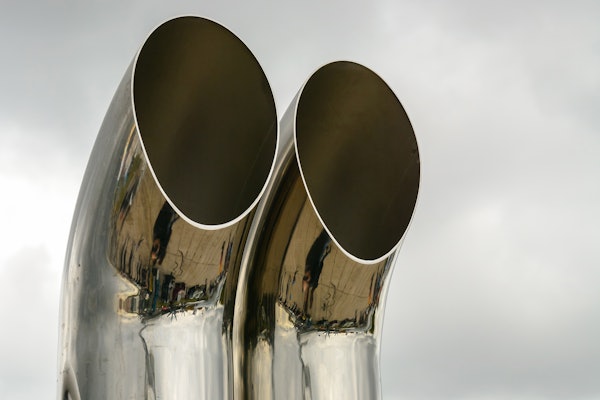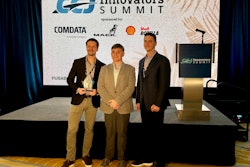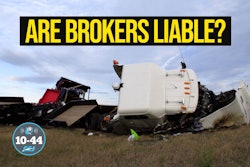As ATA chairman, Fred Burns will challenge individual members to set the association’s direction.
Fred Burns, Jr. plans to spend the next year urging people to get more involved and committed to the future of trucking as he leads the 70-year-old American Trucking Associations. “I don’t think my position as chairman of ATA is to set policy or even goals,” says Burns, president and co-owner of Marlinton, W.Va.-based Burns Motor Freight. “I want to see it be a member-driven organization.”
Motor carriers have a wide variety of concerns, says Burns, who currently is ATA’s first vice chairman and is slated to become chairman this month. “I can talk to 50 members and get 50 opinions on 50 different topics.” ATA policies aren’t handed down from on high but instead rise up from the rank-and-file through the policy committees, he says.
Yet Burns hardly views the post of chairman as insignificant. “It’s an honor,” he declares. Burns declined the assignment several years ago because he didn’t believe he was yet prepared for the challenge. Today, it’s a different story.
“I would like to get people involved in and committed to this industry,” Burns says. “There are so many people out there who maybe have a membership in a state association or ATA but never go to any meetings, never get involved and never help with any of the work. If you are going to have a successful organization, everyone has to chip in and have some input into how that organization operates.”
Burns hopes to use his tenure as chairman to help ATA members – and would-be members – understand how individual member companies help shape ATA policy. And he will work to increase the services ATA provides to improve the value of membership.
A true investment
Burns Motor Freight has been a member of ATA and the West Virginia, Virginia, Maryland and North Carolina trucking associations “as long as I can remember,” says Burns, whose father, Fred Burns, Sr., founded the company in 1949. The younger Burns’ active involvement with ATA began in 1978 when he served as president of the West Virginia state association and attended his first ATA annual meeting. In the following years, he was active in the safety, human resources and technology committees and helped found and later chaired the Small Carrier Advisory Committee.
“I have always felt that if you are going to be a member of an association or any organization, you have to be able to add something to it rather than sit around and complain about what other people do,” Burns says. “I think that’s the problem we have with so many of our associations today. There are so many people who sit on the sidelines and don’t get involved. But they like to complain about what the association is doing.”
There is ample opportunity to provide input, Burns says. The policy committees, which feed issues to the board of directors for consideration, all have room for more people. And the board of directors meeting isn’t a closed, back-room session but rather “a period when people can get up and say whatever they want.”
Perhaps the biggest excuse Burns hears for non-involvement is lack of time. That’s shortsighted, he believes. “If you are going to get something out of it, you have to put something into it.”
“My involvement with ATA has been an investment in our company,” says Burns. He cites as an example the association’s success in blocking the complex and onerous proposal three years ago for revamping driver hours-of-service rules. And he thinks ATA’s upcoming efforts to address the 2007 heavy-duty engine emissions standards will prove similarly valuable to Burns Motor Freight and the rest of the trucking industry.
Over the years, the investment in membership has returned benefits in resources and services. For example, fresh out of college in the early 1960s with an accounting degree, Burns encountered an ICC Bureau of Accounts inspector who declared bluntly that Burns’ college education “doesn’t mean anything in the trucking business.” For help in setting up the company’s books, Burns turned to ATA’s National Accounting and Finance Council.
“A small company can’t afford to have specialists in environmental, legal and insurance issues,” Burns says. “But there are specialists you can call at ATA.”
ATA cut back on services and resources several years ago in an effort to focus its energies on advocacy, but Burns believes ATA must build back some of the member services, especially in areas of professional expertise. “You can’t set up every department to hold everybody’s hand and take care of every little need. But you have to have something to offer members.”
Burns was disappointed, for example, in ATA’s decision several years ago to eliminate the state laws department. “You may have an attorney who knows all the laws in his particular state or at the federal level. But if he’s in Nebraska, maybe he doesn’t know all the laws in West Virginia.” Burns plans to propose restoring that function within ATA.
Focusing on members
Selective enhancement of ATA’s member support capabilities is just one of many potential initiatives within a renewed focus on membership service. As first vice chairman, Burns chaired the membership committee, which had long been a frustrating assignment. “The membership department at ATA has been reorganized and will be more effective for the future growth of ATA,” he says.
Reform started with the committee itself. The 100-person membership committee had been meeting for one hour twice a year. “How do you accomplish anything doing that?” At Burns’ request, ATA Chairman Vern Garner appointed a special six-member subcommittee to spearhead a reorganization of the membership department.
One of the subcommittee’s first recommendations to ATA President Bill Graves was that ATA hire a professional sales person to head up membership and sales. So in May, Graves appointed
The sons of owners Fred and Larry Burns hold key positions. Fred’s sons John (center) and Doug (left) head operations and safety, respectively. Larry’s son Mike (right) oversees maintenance.
Dean Ford to the newly created position of senior vice president for membership and marketing. Ford, who was instrumental in building the PrePass system and previously held key positions with Qualcomm and Rockwell, is focusing on membership recruitment and retention and development of marketing programs for ATA products and services.
One service Burns would like ATA to offer someday is health insurance coverage for member companies. Legislation that would allow such plans has advanced in Congress but awaits Senate action. But as it expands member services, ATA must take care not to hurt the overall federation, Burns says.
“The first thing we have to look at is what the states are offering. We can’t come in and take away a state association program.” On the other hand, ATA may be able to help the state associations offer better programs that are still profitable for all parties, Burns says.
Need for unity
Burns regrets the energy wasted within the ATA membership ranks on us-versus-them thinking- disputes between large and small carriers or between truckload and less-than-truckload. “We are going to have disagreements. But we should at least be able to sit down and talk about those disagreements.” He credits Bill Graves for a leadership style that puts a premium on listening and building consensus.
For Burns, the time for debate is during policy formulation. The board of directors is so diverse that its decisions will reflect a give-and-take of all the interests, he says. That’s the approach David McCorkle took as chairman of the hours-of-service reform committee, Burns says. It took years, but ATA ultimately developed a unified position. Everyone won’t always get their way, but that’s not a reason to quit. “That’s not the way to continue a strong association.”
And a strong association is needed now more than ever. ATA is working, for example, to support tort reform and curb punitive damages, and frivolous lawsuits. That’s been a special cause for Burns, who has chaired ATA’s Insurance Task Force for the past two years.
Another concern is the industry’s tax burden, especially in light of the financial crises that have hit states in recent years. “I’m sure they are going to look at fuel tax increases or some way to tax trucks,” Burns says. “The trucking industry is so visible that anytime there is a problem, we are the industry regulators look to.” He points out that states’ fuel tax receipts will rise anyway because the new low-emissions engines burn more fuel.
Similarly, the industry needs to be united in the face of the upcoming 2007 engine emissions rules, he says. “I think we have the ability to convince the environmental people that this is the wrong move at this time – until we have better testing, engineering and experience with this type of technology. I just think that burning more fuel is not going to be the solution.”
Many of the industry’s problems boil down to poor image, created by a few, and a lack of public understanding about trucking, Burns says. “It is the responsibility of every motor carrier to make sure their drivers and equipment reflect a positive image. It only takes one truck to ruin the image of the trucking industry.”
Putting out fires
Leading an industry association requires resolving many little problems before they become major crises. “My experience with the trucking industry and with the American Trucking Associations is that it changes everyday,” says Fred Burns, president and co-owner of Burns Motor Freight and incoming chairman of ATA. “I can sit here and tell you that we are going to do this or that tomorrow, but something will come up to change that.”
But putting out fires shouldn’t be too difficult for Burns, who served as chief of the volunteer fire department in Marlinton, W.Va., for nearly three decades.
Burns began volunteering with the fire department in high school and resumed his work there upon returning to Marlinton after college and a brief tour of duty in the Army. One evening, Burns dropped by a fire department meeting late on the way home from an Army Reserves event. “They congratulated me for being elected fire chief,” he recalls.
Twenty-eight years later, Burns retired as chief after essentially rebuilding a department largely ruined by a major flood in November 1985. The same flood dumped about 6 feet of water into Burns Motor Freight’s headquarters and destroyed the homes of several employees.
Burns Motor Freight still owns its first truck, a Mack LJT tractor Fred Burns, Sr. (left) purchased used in 1949.
Burns Motor Freight: Rolling through seven decadesWhen Fred Burns Sr. bought a year-old Mack LJT tractor in 1949, his first line of business was hauling lumber. Nearly 55 years later, wood products – lumber, wood chips and building materials – remain the principal freight. The Burns family still owns Burns Motor Freight, which is still based in the town where its founder grew up, Marlinton, W.Va.
Also constant through the years is Fred Burns Jr.’s involvement in the business. Aside from his time at West Virginia University in Morgantown and a six-month tour in the Army, the younger Burns has lived in Marlinton all his life and worked for Burns Motor Freight since he was in high school.
Burns didn’t necessarily plan it this way. In college, he majored in accounting and envisioned a career in business. But he also was in ROTC and, given his lifelong interest in transportation, took an Army assignment with the Transportation Research & Engineering Command.
About this time, Burns married Carolyn Barlow, another Marlinton native who also had gone to West Virginia University. The new family faced a major decision. Another tour of duty promised to take Fred and Carolyn to Europe, and Carolyn was eager to go. But Fred couldn’t shake the trucking industry. “I just had a desire to see a trucking company grow,” Burns says. So he returned to Marlinton and began helping his father grow the company, which at the time had about 15 trucks.
Instead of a career in the Army, Burns served eight years in the Army Reserves. And Carolyn wasn’t too disappointed when it turned out that Fred’s unit shipped off to Greenland instead of England or France.
Returning to the business in 1960, Burns began setting up an accounting system and helped his father acquire operating authority. A few years later, the elder Burns bought a farm and decided to transfer the business to his three sons. By 1968, Burns Motor Freight had around 20 trucks and Fred Burns Jr. was president.
In the years since, Burns has focused the company squarely on a customer base in the wood products industry, dropping seasonal dump truck and livestock-hauling businesses. Today, Burns Motor Freight operates approximately 100 power units – all Macks – and maintains terminals in Beverly and Sam Black Church, W.Va.
Fred’s brother Larry is a co-owner of the business and vice president in charge of the maintenance operation. Fred and Larry bought out their third brother about 10 years ago. The owners’ sons hold key positions in the business. Fred’s sons John and Doug are vice president of operations and safety director, respectively. Larry’s son Mike is maintenance director.
Today, Fred Burns Sr. still runs the farm he bought about 40 years ago. He raises cattle – freight he once hauled with his first truck when no lumber was available. And Burn Motor Freight still owns that 1948 Mack LJT tractor, now restored to mint condition.






